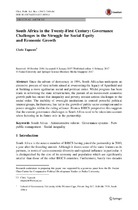| dc.contributor.author | Tapscott, Chris | |
| dc.date.accessioned | 2021-08-05T12:39:19Z | |
| dc.date.available | 2021-08-05T12:39:19Z | |
| dc.date.issued | 2017 | |
| dc.identifier.citation | apscott, C. (2017). South Africa in the twenty-first century: Governance challenges in the struggle for social equity and economic growth . Chinese Political Science Review, 2(1), 69–84. https://doi.org/10.1007/s41111-017-0055-1 | en_US |
| dc.identifier.issn | 2365-4252 | |
| dc.identifier.uri | 10.1007/s41111-017-0055-1 | |
| dc.identifier.uri | http://hdl.handle.net/10566/6488 | |
| dc.description.abstract | Since the advent of democracy in 1994, South Africa has undergone an
extensive process of state reform aimed at overcoming the legacy of Apartheid and
at building a more egalitarian social and political order. Whilst progress has been
made in reforming the state infrastructure, the pursuit of an inconsistent economic
growth path has meant that inequality and poverty remain serious challenges to the
social order. The inability of oversight institutions to control powerful political
interest groups, furthermore, has led to the growth of public sector corruption and to
power struggles within the ruling alliance. From a BRICS perspective this suggests
that the current governance challenges in South Africa need to be taken into account
when factoring in its future role in the partnership. | en_US |
| dc.language.iso | en | en_US |
| dc.publisher | Springer Nature | en_US |
| dc.subject | South Africa | en_US |
| dc.subject | Administrative reform | en_US |
| dc.subject | Governance systems | en_US |
| dc.subject | New public management | en_US |
| dc.subject | Social inequality | en_US |
| dc.title | South Africa in the twenty-first century: Governance challenges in the struggle for social equity and economic growth | en_US |
| dc.type | Article | en_US |

